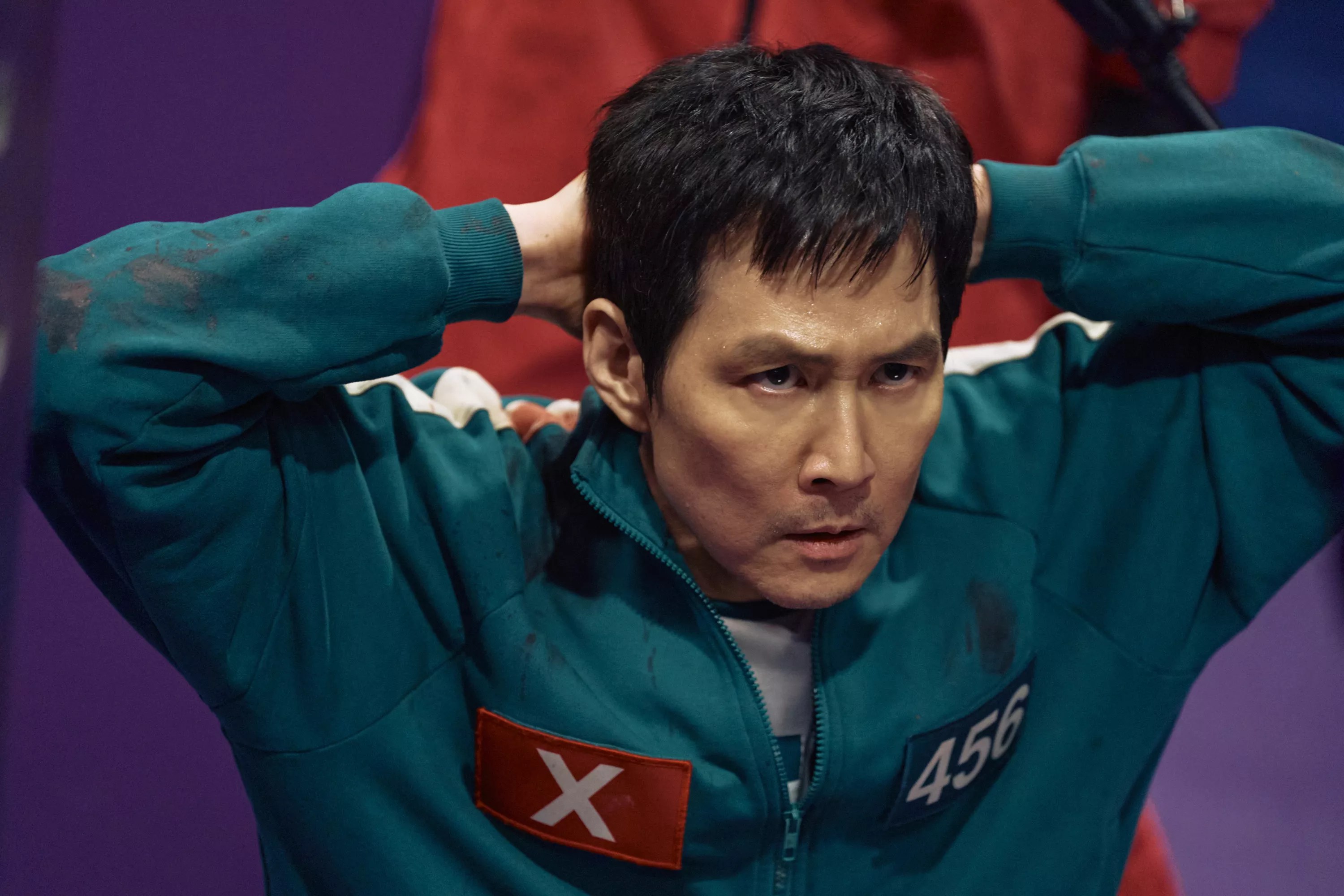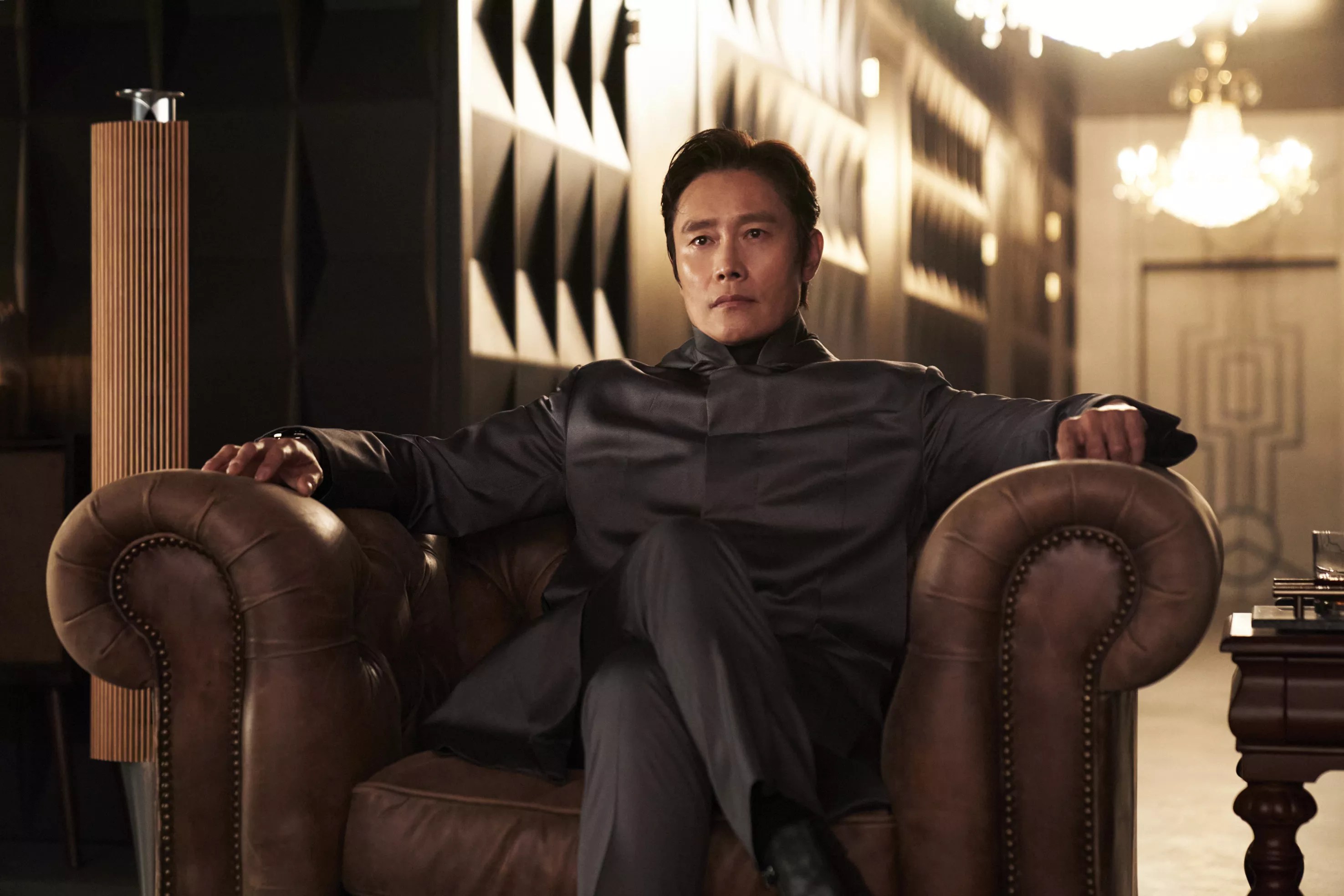
Netflix photo

Audio By Carbonatix
Was there ever any chance Squid Game could turn the world against capitalism?
As theorist Marshall McLuhan wrote, the medium is the message. Expecting a big-budget international TV drama airing on the world’s biggest streamer to inspire radical uprisings is like expecting a cat to bark like a dog. And yet, something about the show felt genuinely subversive. Fusing the twisted violence of Battle Royale and the class warfare of Parasite with the pastel wackiness of Wipeout and Takeshi’s Castle, it took years for director Hwang Dong-hyuk’s passion project about a sadistic contest where the poor and desperate risk their lives playing children’s games for unimaginable sums, to finally get picked up by Netflix.
The idea, inspired by Hwang’s troubles with debt, resonated with many people. Squid Game became a massive word-of-mouth success and a gigantic hit for the streamer when it launched in 2021. That had as much to do with the crazy premise and gratuitous violence as it did with the fact that people saw their own lives – trapped in the eternal rat race death trap of contemporary capitalist society, in which the poor are one bad day away from total destruction and the wealthy laugh in their faces – reflected in the show. It’s the same reason a not-insignificant number of people have cheered the assassin of UnitedHealthcare CEO Bryan Thompson, to the point of turning the killer into something of a folk hero. However cold-blooded the murder was, it served as a rare example of a wealthy person whose decisions as head of a massive private health insurer have likely ruined plenty of lives, finally suffering consequences despite all efforts to ensure such people operate with absolute impunity.

Director Hwang Dong-hyuk did not receive residuals from the first season of Squid Games despite making nearly a billion dollars for Netflix.
Netflix photo
And just as the alleged killer Luigi Mangione is in the process of being defanged and absorbed as yet another meaningless pop culture signifier, you really have to marvel at how quickly Netflix turned Squid Game from an insightful, twisted, politically astute K-drama into a total cash-in fiesta, with tie-in video games, merchandise, and more. The fictional games have been nonlethally re-enacted at least twice. First, YouTuber MrBeast produced his own re-creation of Squid Game that helped catapult him to mainstream fame; his Amazon Prime show Beast Games serves as counter-programming to the new season. Then Netflix stepped in with its own Squid Game: The Challenge, an official reality-competition version. Both entities seem oblivious, intentionally or not, to the inherent depravity of re-creating the show in earnest; both Beast Games and The Challenge have also inspired legal action from former contestants.
That success didn’t seem to translate for Hwang, who reportedly does not receive residuals or an ownership stake in the IP despite making nearly a billion dollars for Netflix. So that makes his decision to direct two more seasons of the show understandable – it’s less Squid Game 2: The Search For More Money than it is The Search for the Money I Should Have Gotten. The new season picks up two years after the end of the first as Seong Gi-hun (Lee Jung-jae), the guilt-wracked winner of last season, has spent much of the fortune he won – “blood money,” he frequently calls it – attempting to track down and destroy the shadowy organization that runs the games, including the Recruiter (Gong Yoo) and its leader the Front Man (Lee Byung-hun). Allying with former police detective Hwang Jun-ho (Wi Ha-joon), who infiltrated the games disguised as a guard, Gi-hun winds up outmaneuvered and forced by circumstance to rejoin the games.

Park Sung-hoon (left) in Squid Game 2
Netflix photo
From there, it’s much the same as last time. There are a few new games and a new crop of contestants: an elderly woman (Kang Ae-shim) and her son (Yang Dong-geun) who enter independently to pay off his gambling debts; a pregnant young woman (Jo Yu-ri) and her deadbeat crypto YouTuber boyfriend (Im Si-wan) who runs afoul of a rapper (Choi Seung-hyun) that lost money on his investment tips. Out of all these new players, the biggest impression is made by transgender ex-special forces operator Hyun-ju (Park Sung-hoon, a cis male actor whose casting sparked controversy), who seeks to complete her gender confirmation and start a new life in Thailand.
There is one crucial update from last time. After each round, players vote on whether to keep playing and continue risking their lives for cash or to stop. If they choose to leave, they win all the money accumulated to that point, and the more die, the more cash they all win. But the votes are ridiculously unfair, with an active tally shown onscreen and players forced to wear their choice as a literal badge on their uniforms. Factionalization, meddling from above, and conspiracies among the greedier players combine to keep the carnage going. (People voting against their self-interest for the sake of economic prosperity? Doesn’t sound familiar at all.)

Lee Byung-hun in Squid Game 2
Netflix photo
Beyond this cynical examination of how easy it is to manipulate democracy, there’s not much distinguishing this season from the last. The show’s direction and editing remain acrobatic and stylish, taking clear guidance from fellow Koreans such as Park Chan-wook, but there’s not much that feels new. Aside from some bravura action sequences, especially in the final episode, a lot of Squid Game 2 feels like a retread. The mysteries of the games have mostly been revealed, and since we’ve already run through them once, they feel like a distraction from Gi-hun’s quest. The show is, for better or worse, the commercial apogee of the Hallyu, the world-conquering Korean pop culture wave, in visual media – one hopes it won’t prove to be the creative peak as well.
So, is there any radical potential left in this cash-in sequel? If it exists, it’s in Gi-hun. Hardened by his experience, he constantly searches for ways to keep people alive and finally put an end to the games. He’s been transformed from a good-natured loser to a true leader, one who utilizes cooperation and collective action as a means of liberation. His efforts culminate in a dramatic yet predictable conclusion that leaves plot threads unresolved and will leave viewers wanting. That the show’s villains have to resort to sabotage, deceit, and divide-and-conquer tactics to stop Gi-hun is as much a reflection of the dishonorable nature of those in power as it is plot mechanics. After all, we have to leave things open for a third season.
Squid Game 2. Starring Lee Jung-jae, Lee Byung-hun, Wi Ha-joon, Gong Yoo, and Park Sung-hoon. Written and directed by Hwang Dong-hyuk. Seven episodes. Rated TV-MA. Streaming on Netflix starting Thursday, December 26.